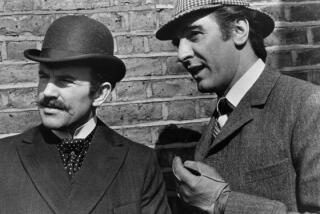Separation of Church, State Makes Statute Unconstitutional, Court Rules : Copyright Law for Christian Scientists Stricken
- Share via
WASHINGTON — A 1971 law giving the Christian Science Church an extended copyright to its central theological text was declared unconstitutional this week by a federal appeals court.
The U.S. Circuit Court of Appeals here said the law giving the church a copyright to all editions of “Science and Health with Key to the Scriptures” is unconstitutional because it “offends the fundamental principles of separation of church and state.”
The case stems from an attempt by a dissident group of Christian Scientists to publish its own version of the work of Mary Baker Eddy, who founded the religion in the late 19th Century.
An ‘Internal Dispute’
The appellate court found that the law “confers upon a religious body an unusual measure of copyright protection by unusual means, and in a fashion that interjects the federal government into internal church disputes over the authenticity of religious texts.”
The court made the ruling on a challenge by the United Christian Scientists. It upheld an earlier finding by U.S. District Judge Thomas Penfield Jackson.
The dissident group filed suit in 1983 after it was forced by the First Church of Christ, Scientist to remove copyright material from cassette recordings it distributes to its 11,000 members.
The group also planned to publish its version of the 1910 edition of “Science and Health” and sought a declaratory judgment that the mother church did not have the power to prevent use of the material in that book in the new publication.
In Public Domain
All editions of the work except one printed in 1906 had passed into the public domain when Congress passed the private law in 1971 giving the church an extended copyright to all versions.
The court found that the law did not have a secular purpose, as required by the Supreme Court.
“We find the legislative record fraught with expressions of an intent to assist achievement of a religious goal,” the court said.
“When Congress departs from generalized copyright legislation and enacts special copyright protection for a religious entity in order to enhance its sway over the manner of religious worship, it has engaged in ‘sanctioning official prayers,’ a quintessential act of Establishment.”
A Senate report said the bill was needed “to preserve and maintain the integrity of the statement of the religious teachings of this denomination.”
The court said “it is not the function of government to promote religious worship, to enable a religious entity to control statements of church doctrine, or to guide a ‘confused’ public to ‘correct’ religious authority.”
Together with the Bible, “Health and Science” is regarded as the church’s pastor. Lay readers conduct the church services.
“Though ‘Science and Health’ is the pastor to Christian Scientists, it is not the office of Congress to grant continual, if indeed not perpetual, dominion over the text to First Church in order that it may serve that end,” the court said in an opinion by Judge Spotswood Robinson.
“It is for First Church, not Congress, to identify and maintain an authoritative ‘Science and Health.’ ”
More to Read
Sign up for Essential California
The most important California stories and recommendations in your inbox every morning.
You may occasionally receive promotional content from the Los Angeles Times.










